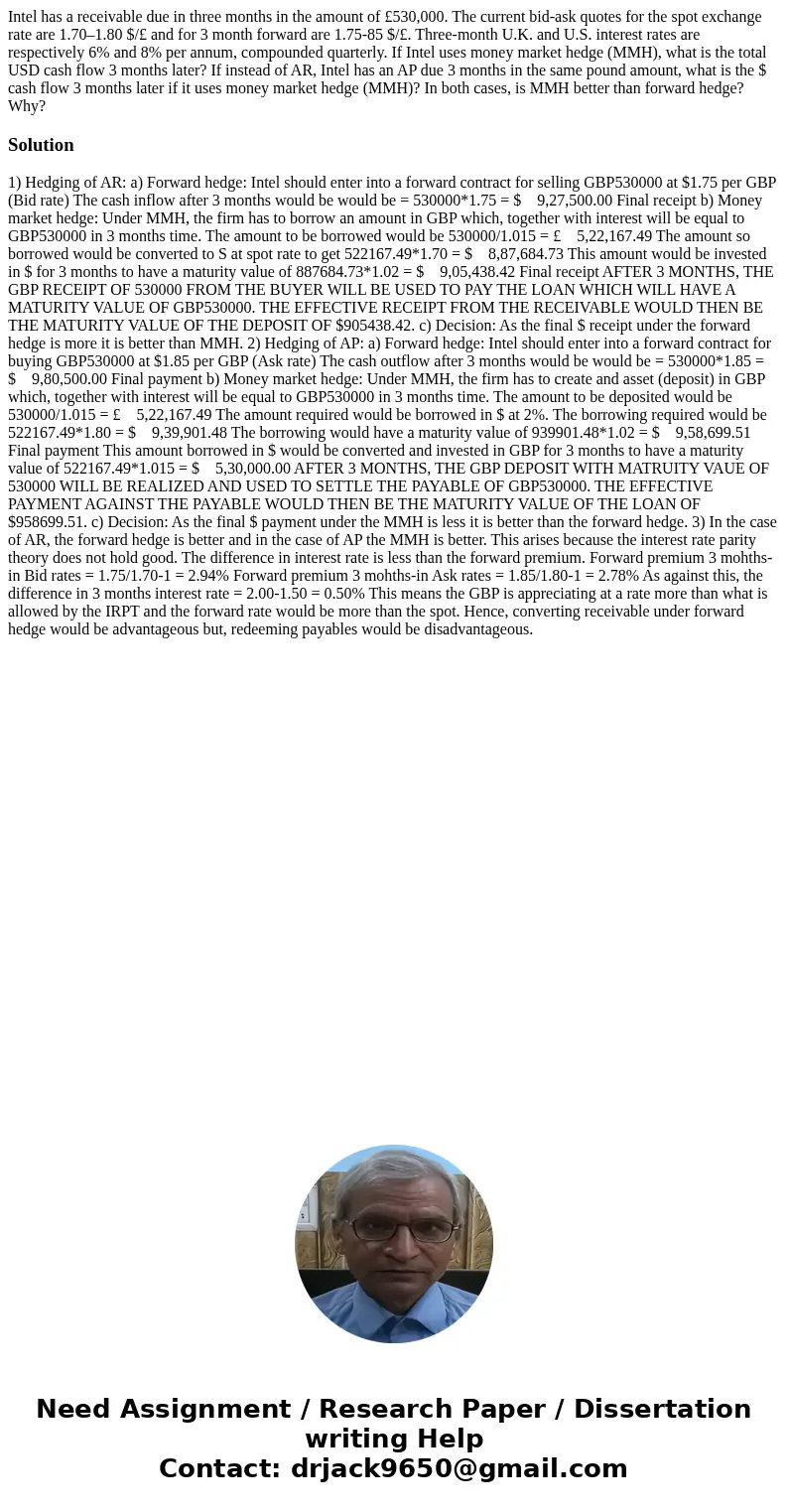Intel has a receivable due in three months in the amount of
Intel has a receivable due in three months in the amount of £530,000. The current bid-ask quotes for the spot exchange rate are 1.70–1.80 $/£ and for 3 month forward are 1.75-85 $/£. Three-month U.K. and U.S. interest rates are respectively 6% and 8% per annum, compounded quarterly. If Intel uses money market hedge (MMH), what is the total USD cash flow 3 months later? If instead of AR, Intel has an AP due 3 months in the same pound amount, what is the $ cash flow 3 months later if it uses money market hedge (MMH)? In both cases, is MMH better than forward hedge? Why?
Solution
1) Hedging of AR: a) Forward hedge: Intel should enter into a forward contract for selling GBP530000 at $1.75 per GBP (Bid rate) The cash inflow after 3 months would be would be = 530000*1.75 = $ 9,27,500.00 Final receipt b) Money market hedge: Under MMH, the firm has to borrow an amount in GBP which, together with interest will be equal to GBP530000 in 3 months time. The amount to be borrowed would be 530000/1.015 = £ 5,22,167.49 The amount so borrowed would be converted to S at spot rate to get 522167.49*1.70 = $ 8,87,684.73 This amount would be invested in $ for 3 months to have a maturity value of 887684.73*1.02 = $ 9,05,438.42 Final receipt AFTER 3 MONTHS, THE GBP RECEIPT OF 530000 FROM THE BUYER WILL BE USED TO PAY THE LOAN WHICH WILL HAVE A MATURITY VALUE OF GBP530000. THE EFFECTIVE RECEIPT FROM THE RECEIVABLE WOULD THEN BE THE MATURITY VALUE OF THE DEPOSIT OF $905438.42. c) Decision: As the final $ receipt under the forward hedge is more it is better than MMH. 2) Hedging of AP: a) Forward hedge: Intel should enter into a forward contract for buying GBP530000 at $1.85 per GBP (Ask rate) The cash outflow after 3 months would be would be = 530000*1.85 = $ 9,80,500.00 Final payment b) Money market hedge: Under MMH, the firm has to create and asset (deposit) in GBP which, together with interest will be equal to GBP530000 in 3 months time. The amount to be deposited would be 530000/1.015 = £ 5,22,167.49 The amount required would be borrowed in $ at 2%. The borrowing required would be 522167.49*1.80 = $ 9,39,901.48 The borrowing would have a maturity value of 939901.48*1.02 = $ 9,58,699.51 Final payment This amount borrowed in $ would be converted and invested in GBP for 3 months to have a maturity value of 522167.49*1.015 = $ 5,30,000.00 AFTER 3 MONTHS, THE GBP DEPOSIT WITH MATRUITY VAUE OF 530000 WILL BE REALIZED AND USED TO SETTLE THE PAYABLE OF GBP530000. THE EFFECTIVE PAYMENT AGAINST THE PAYABLE WOULD THEN BE THE MATURITY VALUE OF THE LOAN OF $958699.51. c) Decision: As the final $ payment under the MMH is less it is better than the forward hedge. 3) In the case of AR, the forward hedge is better and in the case of AP the MMH is better. This arises because the interest rate parity theory does not hold good. The difference in interest rate is less than the forward premium. Forward premium 3 mohths-in Bid rates = 1.75/1.70-1 = 2.94% Forward premium 3 mohths-in Ask rates = 1.85/1.80-1 = 2.78% As against this, the difference in 3 months interest rate = 2.00-1.50 = 0.50% This means the GBP is appreciating at a rate more than what is allowed by the IRPT and the forward rate would be more than the spot. Hence, converting receivable under forward hedge would be advantageous but, redeeming payables would be disadvantageous.
 Homework Sourse
Homework Sourse